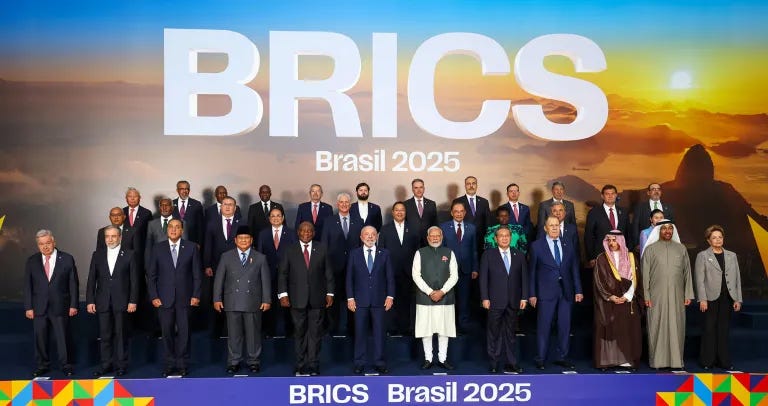
ETGovernment.com, a news and information online outlet in India, describes the Rio de Janeiro Declaration, emitted by the Seventeenth BRICS Summit of July 6-7, 2025, as “a sweeping and assertive manifesto that places the Global South at the center of 21st-century multilateralism.” ETGovernment asserts, “At the heart of the Rio Declaration lies a clear and consistent message: the post-war architecture of global governance must be reformed to reflect contemporary multipolarity.”
BRICS is undertaking what the Indian news outlet calls a bold southern turn.
Seventeen years after its inception, BRICS has emerged not merely as a grouping of emerging economies but as a platform articulating an alternative global vision. The Rio Declaration reflects this maturity—at once ambitious and pragmatic, multilateralist and sovereignty-conscious, developmentalist and technologically forward-looking. . .. The Global South, long marginalized, has found its voice—and it is now shaping the script.
I would stress that the emergence of BRICS as an expanding interregional association of the States of the Global East and South with increasingly clear anti-imperialist objectives has been unfolding since its founding in 2006 by Brazil, Russia, India, and China, with South Africa joining in 2011. BRICS has demonstrated an increasingly evident orientation toward day-by-day construction of an alternative world order, transforming piecemeal the structures of the neocolonial world-system directed by the United States. Said evolution was evident by the time of the Xiamen Declaration emitted by the 2017 Summit in China, which declared:
We [the BRICS nations] will enhance communication and coordination in improving global economic governance to foster a more just and equitable international economic order. We will work towards enhancement of the voice and representation of BRICS countries and EMDCs [emerging markets and developing countries] in global economic governance and promote an open, inclusive and balanced economic globalization, thus contributing towards development of EMDCs and providing strong impetus to redressing North-South development imbalances and promoting global growth.
We will emphasize fairness and justice to safeguard international and regional peace and stability. We will stand firm in upholding a fair and equitable international order based on the central role of the United Nations, the purposes and principles enshrined in the Charter of the United Nations and respect for international law, promoting democracy and the rule of law in international relations, and making joint efforts to address common traditional and non-traditional security challenges, so as to build a brighter shared future for the global community.
In seeing a central role of the United Nations and the UN Charter, BRICS stands in the tradition of the Spirit of Bandung of the late 1950s and the Non-Aligned Movement and the Third World project of national liberation of the 1960s and 1970s, which appropriated from Western philosophical concepts, but expanding and deepening their meaning from the vantage point of the colonial situation. Today, the nations of the Global South work in and through UN institutions, seeking to attain the full realization in practice of the principles put forth at the founding of the United Nations, with their full meaning discerned from the vantage point of the colonized peoples.
As a result of an initiative toward expansion known as BRICS Plus or BRICS+, the interregional association now has eleven member states and ten partner countries. BRICS expanded its membership in 2024-2025 to include Egypt, Ethiopia, Indonesia, Iran, Saudi Arabia, and the United Arab Emirates. At the BRICS Summit of 2025, Belarus, Bolivia, Cuba, Kazakhstan, Malaysia, Nigeria, Thailand, Uganda, and Uzbekistan were welcomed as partner countries, and the formal inclusion of Vietnam as a partner country was announced. Partner countries are invited to participate in the summits, ministerial meetings, and other initiatives and to sign support for declarations and documents. New member nations and partner countries were selected on the basis of their commitment to the BRICS vision.
The nations of BRICS are seeking to develop in practice a new way for countries to relate to one another. They want to leave behind a world driven by competing imperialisms, in which the world powers maximize their advantage by imposing economic exchanges that exploit other nations, and the other nations form strategic alliances with the powerful as best they can. It is a game of competing interests played by elites, with the national bourgeoisies of weak nations with small economies defending their class interests at the expense of the people.
BRICS envisions mutually beneficial cooperation among nations, in a world-system composed of sovereign States. Accordingly, Article Two of the Rio de Janeiro Declaration asserts: “We reaffirm our commitment to the BRICS spirit of mutual respect and understanding, sovereign equality, solidarity, democracy, openness, inclusiveness, collaboration and consensus.” Article Five declares, “We reiterate our commitment to reforming and improving global governance by promoting a more just, equitable, agile, effective, efficient, responsive, representative, legitimate, democratic and accountable international and multilateral system in the spirit of extensive consultation, joint contribution and shared benefits.”
The Declaration emphasizes that the current architecture of international relations must be adapted to the Principles and Purposes of the Charter of the United Nations, so that said architecture is in accordance with contemporary realities, including the commitment of emerging nations to multilateralism and to more meaningful participation of emerging countries and developing countries in the global decision-making process.



